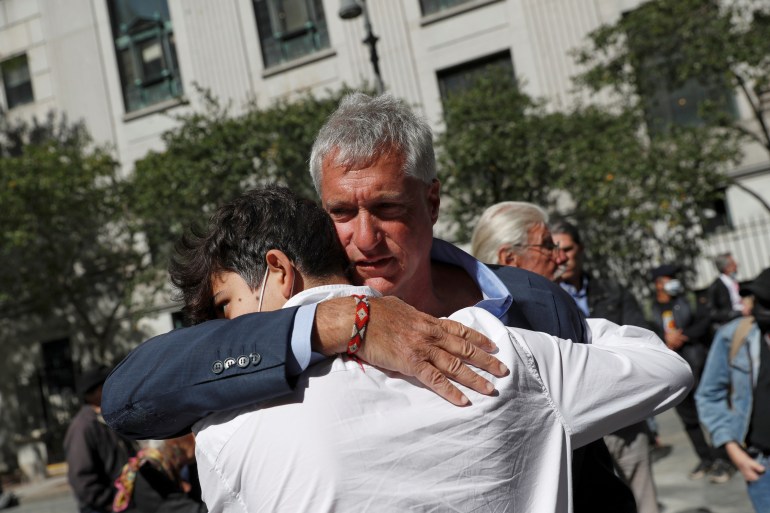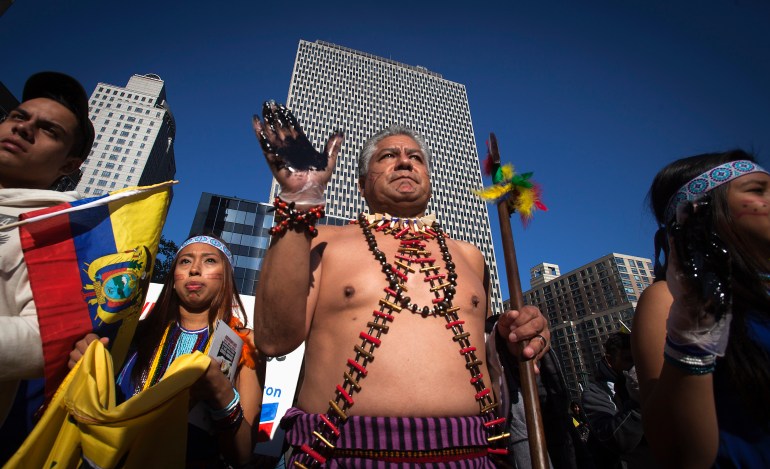Steven Donziger has spent more than two decades battling oil giant over pollution in the Ecuadorian rainforest.

Steven Donziger, who faced criminal contempt charges stemming from his decades-long legal battle with Chevron Corp, embraces his son Matthew after receiving a six-month prison sentence
[Shannon Stapleton/Reuters]
1 Oct 2021
Disbarred American lawyer Steven Donziger, who spent more than two decades battling Chevron Corp over pollution in the Ecuadorian rainforest, has been sentenced to six months in prison on contempt charges.
United States District Judge Loretta Preska sentenced Donziger on Friday after finding him guilty in May of “willfully” defying court orders, including by refusing to turn over his computer and other electronic devices.
KEEP READING
1 Oct 2021
Disbarred American lawyer Steven Donziger, who spent more than two decades battling Chevron Corp over pollution in the Ecuadorian rainforest, has been sentenced to six months in prison on contempt charges.
United States District Judge Loretta Preska sentenced Donziger on Friday after finding him guilty in May of “willfully” defying court orders, including by refusing to turn over his computer and other electronic devices.
KEEP READING
The charges stem from a lawsuit brought against Donziger by the oil giant.
“It seems that only the proverbial two-by-four between the eyes will instil in him any respect for the law,” Preska said.
Donziger’s lawyers and Chevron did not immediately respond to a request for comment from Reuters news agency.
His sentencing is the latest twist in a legal saga stemming from his representation of villagers in Ecuador’s Lago Agrio region who sought to hold Chevron liable for water and soil contamination by Texaco between 1964 and 1992. Chevron acquired Texaco in 2000
“It seems that only the proverbial two-by-four between the eyes will instil in him any respect for the law,” Preska said.
Donziger’s lawyers and Chevron did not immediately respond to a request for comment from Reuters news agency.
His sentencing is the latest twist in a legal saga stemming from his representation of villagers in Ecuador’s Lago Agrio region who sought to hold Chevron liable for water and soil contamination by Texaco between 1964 and 1992. Chevron acquired Texaco in 2000
.

People from Ecuador protest against Chevron in 2013 as a US court considered whether to hold the company liable for a $9.5bn judgement against it [File: Carlo Allegri/Reuters]
Donziger won a $9.5bn judgement against Chevron in an Ecuadorian court in 2011.
But in 2014, a US court rejected the multibillion-dollar judgement, ruling that it had been fraudulently obtained through bribes and corruption.
Reporting from outside the New York City court on Friday, Al Jazeera correspondent Kristen Saloomey said Donzinger and his team tried to place the case “in the greater context of his efforts to bring justice for people in Ecuador”.
But the judge agreed with prosecutors, who had argued Donziger consciously disobeyed court orders to turn over his devices and documents.
Lawyers for Donziger had in May painted a different picture, saying the court had initially been unclear about what it wanted him to hand over.
“The reason I’m locked up is because we were successful,” Donziger told Al Jazeera in an interview before his sentencing.
“I, with other lawyers, helped Indigenous peoples in Ecuador win a historic $9.5bn pollution judgement against Chevron for the deliberate dumping of billions of gallons of cancer-causing waste into the Amazon,” Donziger said.
“That’s an historical fact. That case has been affirmed on appeal by 28 appellate judges, including the highest courts of Ecuador and Canada for enforcement purposes. So why am I the one being locked up? I helped hold them accountable.”
Donziger, who has been held in home confinement for two years, plans to appeal Friday’s decision, Reuters reported.
A panel of human rights experts commissioned by the United Nations said on September 30 that Donziger’s home detention violated international civil rights law and recommended that he be released.
Claire Finkelstein, a law professor at the University of Pennsylvania and the founder and academic director of the Center for Ethics and the Rule of Law, said charging and sentencing a lawyer for a criminal contempt violation is “rather rare”.
“In this case, the judge felt there was an element of willfulness involved, and that explains the results,” Finkelstein told Al Jazeera.
Donziger won a $9.5bn judgement against Chevron in an Ecuadorian court in 2011.
But in 2014, a US court rejected the multibillion-dollar judgement, ruling that it had been fraudulently obtained through bribes and corruption.
Reporting from outside the New York City court on Friday, Al Jazeera correspondent Kristen Saloomey said Donzinger and his team tried to place the case “in the greater context of his efforts to bring justice for people in Ecuador”.
But the judge agreed with prosecutors, who had argued Donziger consciously disobeyed court orders to turn over his devices and documents.
Lawyers for Donziger had in May painted a different picture, saying the court had initially been unclear about what it wanted him to hand over.
“The reason I’m locked up is because we were successful,” Donziger told Al Jazeera in an interview before his sentencing.
“I, with other lawyers, helped Indigenous peoples in Ecuador win a historic $9.5bn pollution judgement against Chevron for the deliberate dumping of billions of gallons of cancer-causing waste into the Amazon,” Donziger said.
“That’s an historical fact. That case has been affirmed on appeal by 28 appellate judges, including the highest courts of Ecuador and Canada for enforcement purposes. So why am I the one being locked up? I helped hold them accountable.”
Donziger, who has been held in home confinement for two years, plans to appeal Friday’s decision, Reuters reported.
A panel of human rights experts commissioned by the United Nations said on September 30 that Donziger’s home detention violated international civil rights law and recommended that he be released.
Claire Finkelstein, a law professor at the University of Pennsylvania and the founder and academic director of the Center for Ethics and the Rule of Law, said charging and sentencing a lawyer for a criminal contempt violation is “rather rare”.
“In this case, the judge felt there was an element of willfulness involved, and that explains the results,” Finkelstein told Al Jazeera.
No comments:
Post a Comment